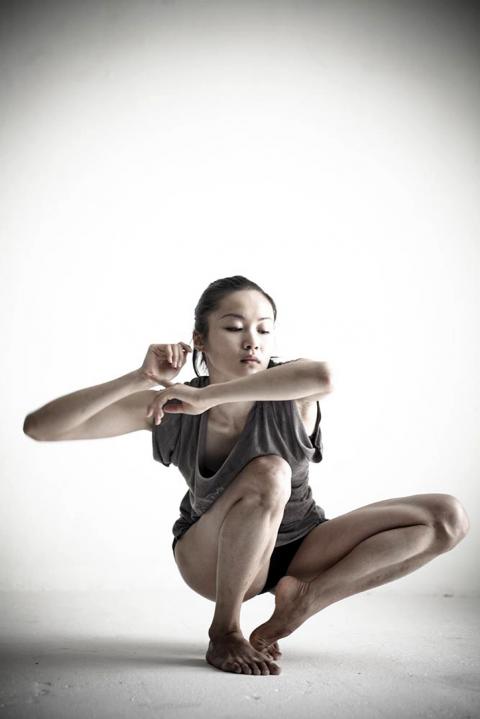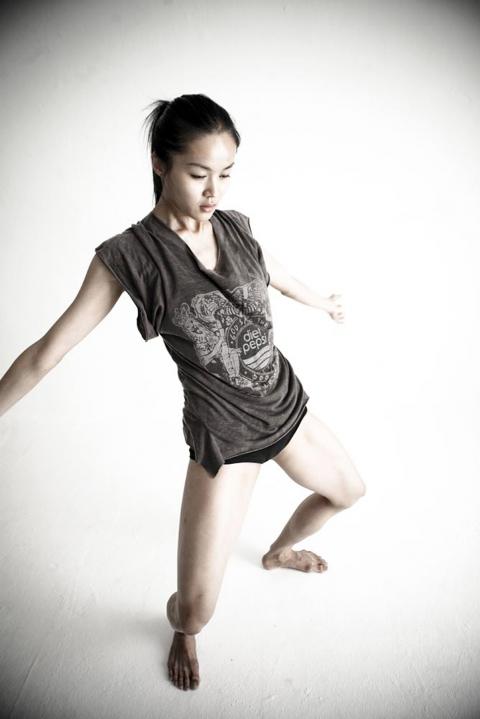Dance fans have been anticipating the Taipei debut of Israel’s acclaimed Batsheva Dance Company this weekend at the National Theater for the chance to see the work of its artistic director, Ohad Naharin. However, there are several dozen people — at least — who are more interested in one of the dancers.
Lee Chen-wei (李貞葳) was recently promoted from the junior troupe — the Batsheva Ensemble — to the main company. When she was in Taipei in August as part of the National Theater’s promotions for its Dance in Autumn series, we met to talk about how a young woman from Yilan County ended up living in Tel Aviv and working for one of the world’s best-known contemporary dance companies.
Sitting in the coffee shop on the ground floor of the theater, Lee — who turns 25 in December — made the transition from being a member of Yilan’s Lan Yang Dance Group (蘭陽舞蹈團) to majoring in dance at Taipei National University of the Arts (國立台北藝術大學) to moving to Israel sound very easy, though she admitted that adjusting to life there has been a challenge.

PHOTO COURTESY OF LEE CHEN-WEI
“There aren’t enough 7-Elevens,” she said.
Lee graduated in 2008 and traveled to Europe last year, thanks to a Lo Man-fei (羅曼菲) dance scholarship and a European Foundation for Culture and Arts Dance grant. Chance led her to an audition in Sweden, which led to a job offer in Israel and opportunities not only to perform, but to choreograph; a piece she did with fellow ensemble dancer Christopher Peterson earlier this year, Elephants, received good reviews.
“I auditioned for a project to tour Sweden for several months doing Batsheva repertoire [a piece called Kamuyot]. It was a three-day audition and I survived to the third day. We warmed up in the morning, than learned the repertoire, then improvisation. They were picking 20 dancers,” Lee said. “After the audition finished, they gave me a private interview. I told them I didn’t know who Ohad [Naharin] was, I only knew the name of the company and that it was from Israel.”

PHOTO COURTESY OF LEE CHEN-WEI
She wasn’t picked for the Sweden project. Instead Naharin wanted her to join the ensemble. She told him she needed time to think, since she had auditioned previously for a small Danish company and had also been offered a job.
“I came back home, checked out Ohad [Naharin] and found out he was a famous guy, so I immediately sent an e-mail to say yes,” she said with a laugh.
Her family in Yilan supported her decision, despite reservations about the dangers of living in Israel.
“My mom really supported me. I have been studying dance since I was five and she has supported me whatever I chose. I told her Batsheva was a famous company,” she said.
Lee is the first Taiwanese to dance with the company, although there have been Japanese members before, as well as dancers from the US, Australia and Europe. She has had to make big adjustments, not only to a new country, but having to learn two new languages simultaneously — Hebrew and then Gaga, the movement technique developed by Naharin.
“The biggest difference is Shabbat — having Friday and Saturday as the weekend and working on Sunday — and seeing all the Haredi [ultra-orthodox Jews],” she said. “They don’t have a lot of Asians there, so a lot of people stare at me. Now I’m used to it. I am always saying ‘I work with Batsheva and I’m from Taiwan.’ I had to learn very quickly how to say in Hebrew: ‘I’m a dancer with Batsheva.’ As soon as people hear that, they are very excited and supportive.”
“I’ve been in the junior company and we tour schools doing the same piece that I auditioned for in Sweden, sometimes two or three shows a week. If we travel to the north, we have to leave at 5 or 6am. For the show we sit in a square, right next to the audience and as we walk around the kids shaking hands I can hear them say ‘China,’ ‘Japan,’ ‘Thailand,’ and I say ‘No. Taiwan!’” she said. “Israelis really like to watch the company. I’ll meet someone and they’ll say ‘I saw the company two months ago,’ or whenever. They are really proud of Batsheva.”
Learning Gaga has been challenging, she said, because it’s so different from what she’s done before and because it requires more personality than she’s used to showing.
Naharin describes Gaga as daily training in the connections between efficacy of movement and habit, between effort and pleasure, and says it is designed to realize the explosion of power, skill and groove that dancers need to go beyond what they know how to do.
Lee said it’s like improvisation, not just doing certain combinations of steps.
“You create your own style. He [Naharin] gives a lot of freedom. It’s very different from other modern dance forms. It develops from your own body. Each dancer is unique. He doesn’t want everyone to look the same,” she said. “In the beginning, I could see that everyone was moving differently, so I wondered who was right ... I wasn’t used to being so free when learning repertory — I always wanted to know exactly what I should do. Now my body is getting freer and freer,” she said.
Going from the ensemble to the main troupe in just one year is pretty unusual, but Lee said it was part of a big shake-up.
“Usually dancers stay in the junior company for two years. This time there has been a big change. Ohad [Naharin] fired four dancers from the main company and promoted three dancers from the ensemble, kept two ensemble dancers who were in their second year and fired everybody else, so the dancers had a big fight with him ... During warm-up in the morning no one would talk to him,” she said.
For Lee, however, the promotion meant the chance to return home with the company, something she was really looking forward to.
“When Ohad [Naharin] promoted me I already knew the company was going to tour Taiwan, so I was really happy. In Israel I have no fans or friends to come see me after the performances. Here I have had to arrange for 50 tickets already,” she said, almost bouncing in her chair.
Asking how long she envisions herself staying in Israel elicited another big smile.
“Moving into the main company is one more step in my development. I can see staying maybe two or three years. I like Europe, I’d like to try living there, but for now I prefer Israel,” she said. “I do miss ballet, though. I’ve had maybe just 10 classes in 11 months and I sometimes I worry that I’ll forget my training.”
“When Ohad [Naharin] promoted me to the main company he told me that when I moved to Batsheva I would have to forget everything I knew before. He said ‘Gaga doesn’t always look so beautiful. You’re too clean,’” Lee said.
When she told him of her doubts about letting go of what she knew, his advice was succinct: “You’re learning something new, you’re not losing anything.”
Lee will be on stage — letting go — when Batsheva opens its three-performance run of Decca Dance 2010 tomorrow night.

As Taiwan’s second most populous city, Taichung looms large in the electoral map. Taiwanese political commentators describe it — along with neighboring Changhua County — as Taiwan’s “swing states” (搖擺州), which is a curious direct borrowing from American election terminology. In the early post-Martial Law era, Taichung was referred to as a “desert of democracy” because while the Democratic Progressive Party (DPP) was winning elections in the north and south, Taichung remained staunchly loyal to the Chinese Nationalist Party (KMT). That changed over time, but in both Changhua and Taichung, the DPP still suffers from a “one-term curse,” with the

Jan. 26 to Feb. 1 Nearly 90 years after it was last recorded, the Basay language was taught in a classroom for the first time in September last year. Over the following three months, students learned its sounds along with the customs and folktales of the Ketagalan people, who once spoke it across northern Taiwan. Although each Ketagalan settlement had its own language, Basay functioned as a common trade language. By the late 19th century, it had largely fallen out of daily use as speakers shifted to Hoklo (commonly known as Taiwanese), surviving only in fragments remembered by the elderly. In

William Liu (劉家君) moved to Kaohsiung from Nantou to live with his boyfriend Reg Hong (洪嘉佑). “In Nantou, people do not support gay rights at all and never even talk about it. Living here made me optimistic and made me realize how much I can express myself,” Liu tells the Taipei Times. Hong and his friend Cony Hsieh (謝昀希) are both active in several LGBT groups and organizations in Kaohsiung. They were among the people behind the city’s 16th Pride event in November last year, which gathered over 35,000 people. Along with others, they clearly see Kaohsiung as the nexus of LGBT rights.

Dissident artist Ai Weiwei’s (艾未未) famous return to the People’s Republic of China (PRC) has been overshadowed by the astonishing news of the latest arrests of senior military figures for “corruption,” but it is an interesting piece of news in its own right, though more for what Ai does not understand than for what he does. Ai simply lacks the reflective understanding that the loneliness and isolation he imagines are “European” are simply the joys of life as an expat. That goes both ways: “I love Taiwan!” say many still wet-behind-the-ears expats here, not realizing what they love is being an